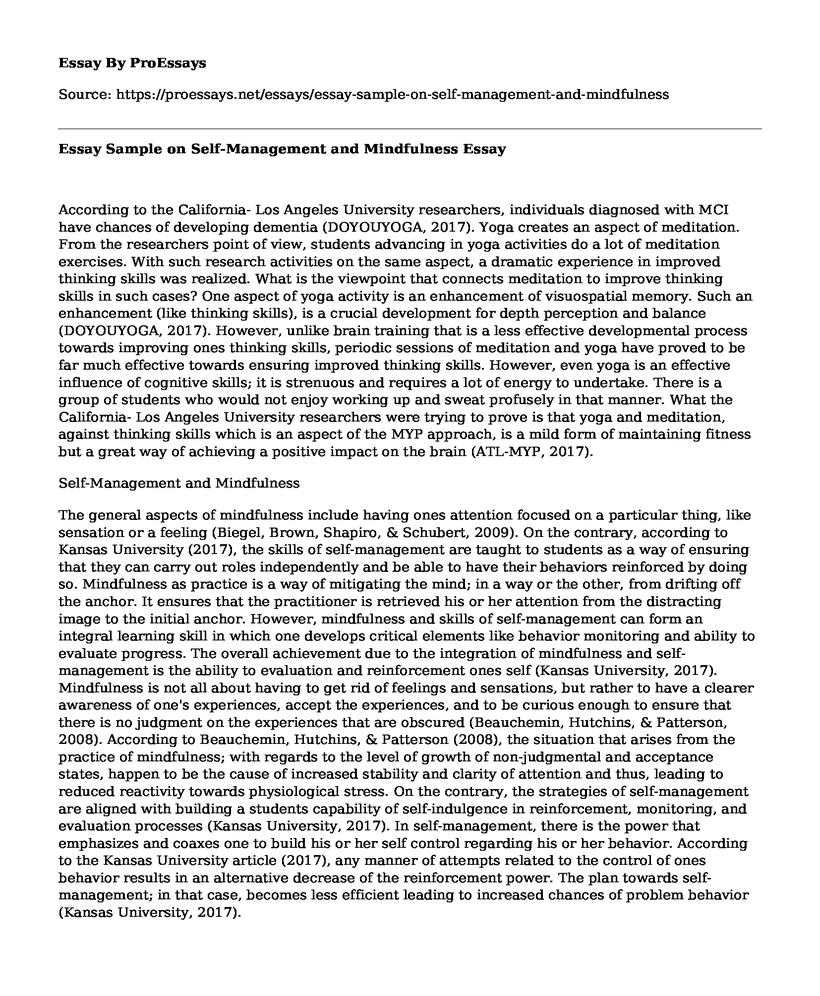According to the California- Los Angeles University researchers, individuals diagnosed with MCI have chances of developing dementia (DOYOUYOGA, 2017). Yoga creates an aspect of meditation. From the researchers point of view, students advancing in yoga activities do a lot of meditation exercises. With such research activities on the same aspect, a dramatic experience in improved thinking skills was realized. What is the viewpoint that connects meditation to improve thinking skills in such cases? One aspect of yoga activity is an enhancement of visuospatial memory. Such an enhancement (like thinking skills), is a crucial development for depth perception and balance (DOYOUYOGA, 2017). However, unlike brain training that is a less effective developmental process towards improving ones thinking skills, periodic sessions of meditation and yoga have proved to be far much effective towards ensuring improved thinking skills. However, even yoga is an effective influence of cognitive skills; it is strenuous and requires a lot of energy to undertake. There is a group of students who would not enjoy working up and sweat profusely in that manner. What the California- Los Angeles University researchers were trying to prove is that yoga and meditation, against thinking skills which is an aspect of the MYP approach, is a mild form of maintaining fitness but a great way of achieving a positive impact on the brain (ATL-MYP, 2017).
Self-Management and Mindfulness
The general aspects of mindfulness include having ones attention focused on a particular thing, like sensation or a feeling (Biegel, Brown, Shapiro, & Schubert, 2009). On the contrary, according to Kansas University (2017), the skills of self-management are taught to students as a way of ensuring that they can carry out roles independently and be able to have their behaviors reinforced by doing so. Mindfulness as practice is a way of mitigating the mind; in a way or the other, from drifting off the anchor. It ensures that the practitioner is retrieved his or her attention from the distracting image to the initial anchor. However, mindfulness and skills of self-management can form an integral learning skill in which one develops critical elements like behavior monitoring and ability to evaluate progress. The overall achievement due to the integration of mindfulness and self-management is the ability to evaluation and reinforcement ones self (Kansas University, 2017). Mindfulness is not all about having to get rid of feelings and sensations, but rather to have a clearer awareness of one's experiences, accept the experiences, and to be curious enough to ensure that there is no judgment on the experiences that are obscured (Beauchemin, Hutchins, & Patterson, 2008). According to Beauchemin, Hutchins, & Patterson (2008), the situation that arises from the practice of mindfulness; with regards to the level of growth of non-judgmental and acceptance states, happen to be the cause of increased stability and clarity of attention and thus, leading to reduced reactivity towards physiological stress. On the contrary, the strategies of self-management are aligned with building a students capability of self-indulgence in reinforcement, monitoring, and evaluation processes (Kansas University, 2017). In self-management, there is the power that emphasizes and coaxes one to build his or her self control regarding his or her behavior. According to the Kansas University article (2017), any manner of attempts related to the control of ones behavior results in an alternative decrease of the reinforcement power. The plan towards self-management; in that case, becomes less efficient leading to increased chances of problem behavior (Kansas University, 2017).
Reference
DOYOUYOGA. (2017). Study: Yoga and Meditation Boost Thinking Skills. DOYOUYOGA.COM. Retrieved 6 June 2017, from https://www.doyouyoga.com/yoga-and-meditation-thinking-skills-study-1627184-68877/
ATL-MYP. (2017). Learning Skills in the MYP Approaches to Learning (ATL) Skills. Retrieved 6 June 2017, from http://www.cusd80.com/cms/lib6/AZ01001175/Centricity/Domain/7761/ATL%20Poster%20with%20IB.pdf
Kansas University. (2017). Positive Behavior Support Interventions/Teacher Tools/Teaching Self-Management Skills | Special Connections. Specialconnections.ku.edu. Retrieved 6 June 2017, from http://www.specialconnections.ku.edu/?q=behavior_plans/positive_behavior_support_interventions/teacher_tools/teaching_self_management_skills
Baer, R. A. (2003). Mindfulness training as clinical intervention: A conceptual and empirical review. Clinical Psychology: Science and Practice, 10, 125143. http://dx.doi.org/10.1093/clipsy.bpg015.
Beauchemin, J., Hutchins, T. L., & Patterson, F. (2008). Mindfulness meditation may lessen anxiety, promote social skills, and improve academic performance among adolescents with learning disabilities. Complementary Health Practice Review, 13,3445. http://dx.doi.org/10.1177/1533210107311624.
Biegel, G. M., Brown, K. W., Shapiro, S. L., & Schubert, C. (2009). Mindfulness-based stress reduction for the treatment of adolescent psychiatric outpatients: A randomized clinical trial. Journal of Clinical and Consulting Psychology, 77, 855866. http://dx.doi.org/10.1037/a0016241.
Bishop, S. R., Lau, M., Shapiro, S., Carlson, L., Anderson, N. D., Carmody, J., et al. (2004). Mindfulness: A proposed operational definition. Clinical Psychology: Science and Practice, 11, 230241. http://dx.doi.org/10.1093/clipsy.bph077.
Gatz, K. L., & Roemer, L. (2004). Multidimensional assessment of emotion regulation and dysregulation: Development, factor structure, and initial validation of the difficulties in emotion regulation scale. Journal of Psychopathology and Behavioral Assessment, 26,4154. http://dx.doi.org/10.1023/B:JOBA.0000007455.08539.94.
Greco, L. A., Baer, R. A., & Smith, G. T. (2011). Assessing mindfulness in children and adolescents: Development and validation of the Child and Adolescent Mindfulness Measure (CAMM). Psychological Assessment, 23, 606614. http://dx.doi.org/10.1037/a0022819.
Greeson, J. M. (2009). Mindfulness research update: 2008. Complementary Health Practice Review, 14(1), 1018. http://dx.doi.org/10.1177/1533210108329862.
Cite this page
Essay Sample on Self-Management and Mindfulness. (2021, Jun 23). Retrieved from https://proessays.net/essays/essay-sample-on-self-management-and-mindfulness
If you are the original author of this essay and no longer wish to have it published on the ProEssays website, please click below to request its removal:
- Film Analysis Essay on The New Asylums: Treatment Of Mentally Ill Offenders
- Paper Example on Crisis Text Line
- The Psychological Concept of Individual Well-Being and Happiness Essay
- Target Behavior Modification Case Studies Paper Example
- Essay Sample on Children With Attention Deficit Disorder
- Essay on My Objectivist Beliefs: How Self-Interest, Reason, Capitalism, and Reality Unify
- Free Paper Sample on Understanding Schizophrenia: Symptoms, Diagnosis, and Nursing Interventions







